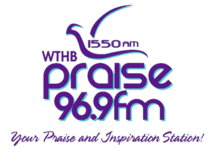WTHB
WTHB-FM, also known as Praise 96.9, is a Christian radio station with an urban gospel format located in the Augusta, Georgia area. The station is licensed by the FCC to the city of Wrens, Georgia to broadcast on 96.9 FM with an ERP of 6.2 kW. The station's studios (which are shared with its other sister stations) and AM simulcast transmitter are co-located at the aptly named intersection of Broadcast Drive and Radio Station Road in North Augusta, South Carolina, while the FM transmitter is southwest of Fort Gordon.
 | |
| City | FM: Wrens, Georgia AM: Augusta, Georgia |
|---|---|
| Broadcast area | Augusta, Georgia |
| Frequency | FM: 96.9 MHz AM: 1550 kHz |
| Branding | Praise 96.9 FM |
| Slogan | Your Praise and Inspiration Station |
| Programming | |
| Format | Urban Gospel |
| Ownership | |
| Owner | Perry Broadcasting |
| Sister stations | WFXA, WAKB, WAEG |
| History | |
| First air date | FM: 1979 AM: 1960 |
| Technical information | |
| Facility ID | FM: 15849 AM: 15843 |
| Class | FM: C3 AM: D |
| Power | AM: 5,000 watts (Daytime) 11 watts (Nighttime) |
| ERP | FM: 6,200 watts |
| HAAT | FM: 121 meters |
| Links | |
| Webcast | Listen Live |
| Website | csrapraise.com |
Praise 96.9 is home to the Yolanda Adams Morning Show.
Station History
96.9 signed on as WYFA in 1988 as an outlet for the Bible Broadcasting Network. It was sold, becoming WAEW in 1993 and WAEJ in 1994 (The lather as a simulcast of UC formatted WAEG as "The New 92.3 and 100.9 The Beat").
Radio One acquired the station(s) in 2001 and flipped to a mostly-automated CHR format while still using "The Beat" branding. By 2002, the simulcast with 92.3 was dropped and 100.9 switched to Urban Gospel under the WTHB call sign.
In August 2007, Radio One sold its Augusta stations (including WTHB) to Perry Broadcasting. On January 11, 2008, the station switched frequencies with sister WAKB and moved to 96.9 FM, a weaker signal. To boost its coverage, it simulcasts with WTHB-AM 1550.
See also
External links
- PRAISE 96.9 — official website
- WTHB in the FCC's FM station database
- WTHB on Radio-Locator
- WTHB in Nielsen Audio's FM station database
- WTHB in the FCC's AM station database
- WTHB on Radio-Locator
- WTHB in Nielsen Audio's AM station database